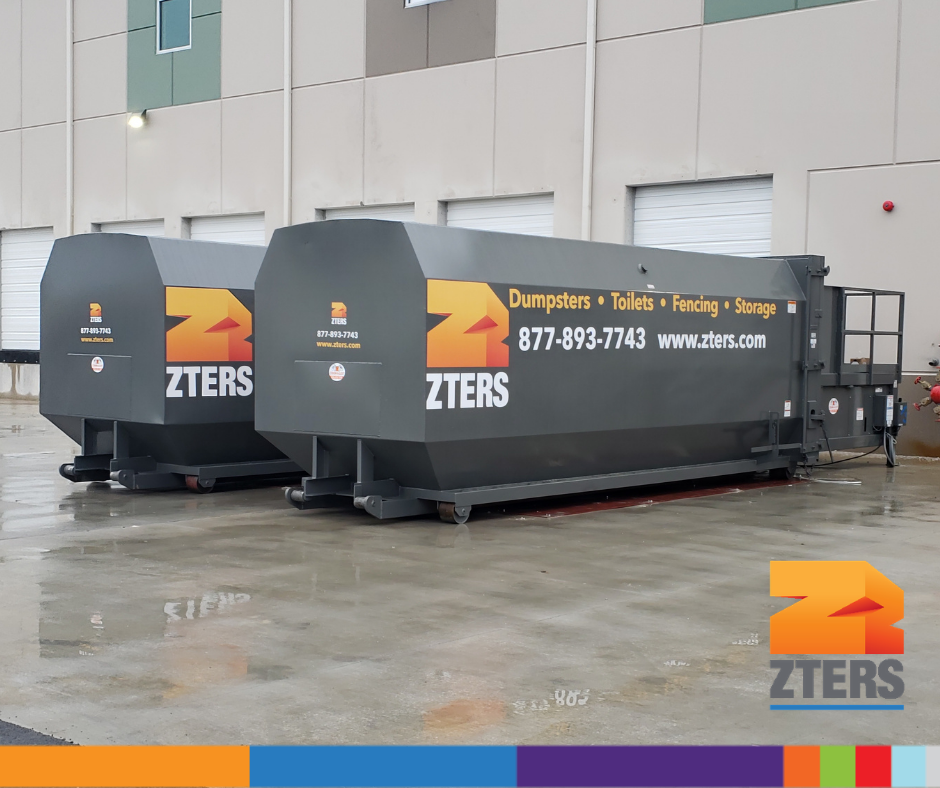Which industrial compactor is right for you?
POSTED ON March 26, 2021 | BY Dan Studer
There are different compactors for different types of waste and businesses, so which industrial compactor is right for your facility? Whether you’re a new facility manager evaluating your waste stream for the first time, or you’re looking at compactors for a new location or different kinds of waste, here’s what you need to know to choose the right industrial compactor.
Self-Contained Compactors
Self-contained compactors are designed to hold wet waste, which makes them useful for locations disposing of food. Managing a restaurant or a university or office building that provides food service? A self-contained compactor is a good option. These compactors are used by grocery stores, restaurants, hospitals, stadiums, universities and other businesses that produce wet waste.
How Does a Self-Contained Compactor Work?
A self-contained compactor may be attached to a building with an opening that allows wet waste to be loaded from the inside. These compactors may also be placed fully inside, or they can be left outside the building, depending on the needs of the business. Wet waste is loaded into the compactor, then a ram compacts the waste until it is pushed inside the container and crushed to a size that’s about 75% smaller than before.
The compactor is fused to the container that holds the waste to prevent leakage. When the container fills up, the container (with compactor attached) is loaded onto a truck. The truck takes the compactor to a landfill where the waste is dumped. Then the entire unit is returned to the business where it begins the process over again.
What Are the Advantages of a Self-Contained Compactor?
Self-contained commercial compactors are designed to be liquid-tight to prevent leaks that could compromise the health and safety of your employees. Additionally, there are fewer odors with self-contained compactors, which is especially important if it’s located indoors. Rodents and insects can’t access your trash while it sits in its container, and many self-contained compactors also come with a self-cleaning flushing feature for convenience.
Vertical Compactors
A vertical compactor, also known as a front-loaded compactor, can be easily emptied using a front-loading truck. They’re perfect for small spaces and buildings that have limited space for a compactor. Vertical compactors hold materials like plastic, cardboard, paper and even some wet materials. Their tall size makes them a good option for apartment buildings and facilities with a narrow trash enclosure.
How Does a Vertical Compactor Work?
To load a vertical compactor, place appropriate waste into the compactor through the front doors. When the container appears full, use the compactor to press down the garbage to reduce its volume.
What Are the Advantages of a Vertical Compactor?
Vertical compactors are relatively small. This makes them ideal for retail locations and businesses with limited space. Their small footprint combines the usefulness of decreased garbage volume with the functionality of a larger stationary compactor.
Stationary Compactors
A stationary compactor is a large trash compactor that compresses dry materials like plastic and cardboard. These compactors are typically used in high-volume waste settings like hospitals, department stores, restaurants and warehouses – however, these compactors are only used to compact the dry materials produced by these businesses. Wet materials should be crushed in self-contained compactors.
How Does a Stationary Compactor Work?
Stationary compactors are bolted to the ground, making them a permanent addition to a facility. The compactor crushes waste into a receiver box, then the container or trailer is hauled to a landfill to be emptied.
What Are the Advantages of Stationary Compactors?
A stationary compactor is larger than a vertical compactor, so it can hold more waste. This type of compactor is the best choice for businesses that produce large quantities of waste every day such as warehouses and large retail locations. We’ve installed stationary compactors at many warehouse locations to help them cut down on their waste volume and right-size the number of weekly pickups they require. Stationary compactors can cut down on the cost of managing large waste volumes.
Not sure if you need a standard stationary compactor or a vertical compactor? We can help you evaluate your waste flow to find the right solution. If you’re still not sure which compactor, or combination of compactors, is best for your business, give us a call to schedule a waste evaluation. We’ll find the right industrial compactor solution, whether you manage one location or one hundred.
